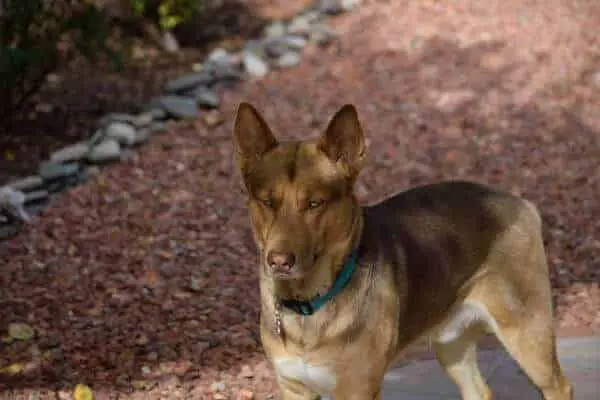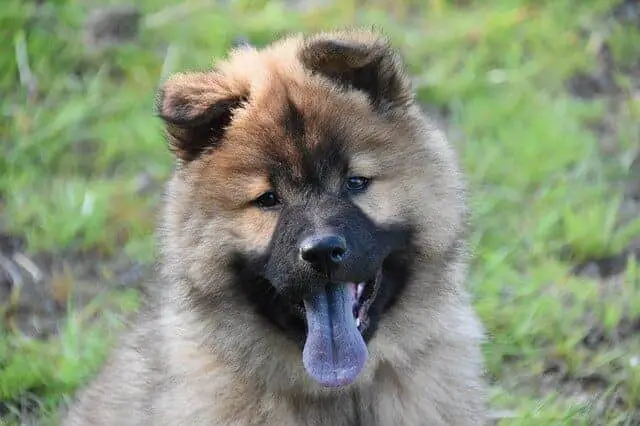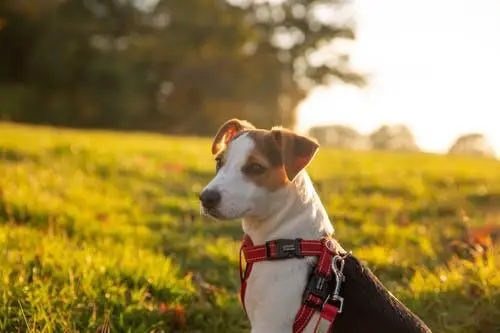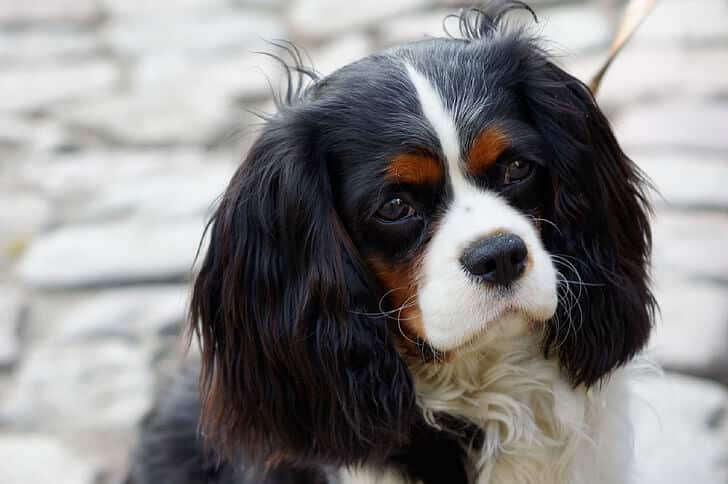Shepsky
No one will dare mess with you if you have a pet Shepsky! Shepskies are fierce-looking dogs who are overly protective of their owners. They are always ready to jump into action when they sense danger or crisis. They are also an inquisitive and investigative dog breed. These things are the reasons why this breed is relied upon by authorities. They mostly work noble jobs such as search and rescue police dogs, military dogs, and guard dogs. Shepskies are built to be purposeful and strong to be able to fulfill such perilous tasks.
Being a crossbreed of a German Shepherd and Siberian Husky means that Shepskies will undeniably inherit the large and athletic physiques of the two breeds. Shepskies got the intelligence and bravery of German Shepherds. Their loyalty and alertness can be attributed to Siberian Huskies.
Physical characteristics can vary from one Shepsky to another. It heavily depends on the stronger gene of their parents. Their broad faces balance their massive bodies. Shepskies can have blue, brown, or black eyes. There is also a possibility for them to have Heterochromia iridum which means that their irises are of different colors. The ears and muzzles of this breed are pointy. Their ears are erect and very sensitive to sound. The noses of Shepskies, on the other hand, are dark-colored. They have a double coat with the inner coat being soft and the outer one being more coarse. Some of the most common colors of their coats include black, brown, tan, cream, and white, or a mixture of these colors.
Shepsky Key Information
Height: 20 – 25 inches
Weight: 45 – 90 pounds
Life span: 13 – 15 years
Breed family: Mixed breed or designer breed
Exercise requirements: High
Good with children: Mostly
Area of origin: U.S.A.
Also Known As:German Husky, Siberian Shepherd, Husky Shepherd
History
This impressive breed has a mysterious past. Little is known about their history. Designer breeds, which Shepskies are part of, rose to fame in the 1980s which is most likely when the mix breeding was made. To understand the past of this breed, it is best to look at it through the history of their parent breeds.
Shepskies are products of two working dogs. The first of which is the Siberian Husky. As the name implies, this breed hails from the Siberian Arctic. The thick coat of the breed protects them from extremely harsh weather. They are known to be helpful sled dogs that help pull heavy loads of baggage. In 1896-1899 during the Alaskan Gold Rush, the breed was imported to the United States and Canada and became a crowd favorite. On the other hand, German Shepherds are known for their devotion and excellence in herding sheep. Compared to Siberian Huskies, German Shepherds are a relatively new breed. Their origin can be traced back to 1899. Like Shepskies, they are also renowned police and military dogs.
One of the earliest and most famous Shepsky was called Dolce. She was the first therapy dog of the FBI and was stationed in the Memphis division. Dolce proved to be a faithful and fearless dog which helped in the promotion and acceptance of the breed. Since Shepskies are a hybrid, they are not recognized by the American Kennel Club (AKC). Nonetheless, they are listed in the American Canine Hybrid Club and the Dog Registry of America Inc.
Personality
A lot of people may be intimidated by the looks of Shepskies which is not a surprise because they’re massive dogs! Shepskies can be territorial or aggressive only when they feel threatened. But that should not be a reason for killing your dreams of owning one. They are caring and loving pets. They care deeply for their masters and their human families. That is the reason they can be aggressive to strangers at times because they’re just protecting their pack. Once the Shepsky gets to know a person and knows that they are harmless, Shepskies will eventually lower their guard down and enjoy their company. All Shepskies need is time to warm up to new people. It may take time but it sure is worth it!
Interaction with Children
Shepskies are overly protective of children in the family. They act as furry bodyguards of the kids. The fierceness of Shepskies is thrown out the window when they are with children. They are gentle and very patient with the younger ones. Early integration and guidance are still needed in terms of the interaction of Shepskies with children.
Shepskies are still very powerful animals that could hurt children unintentionally. Their protective nature can also come into play if children have friends around and are play fighting as the Shepsky may not reaslise the difference When the dog and children are interacting, adults should be always present and on the lookout.
Interaction with other pets
Shepskies are not very social beings when it comes to other animals. They are independent and like to spend time alone. Although like human beings, this breed’s preference varies from one Shepsky to another. One Shepsky may get along with other pets while others do not. It depends on the upbringing and environment of the dog.
Feeding
Feeding Shepskies may pose some challenges. They can be picky when it comes to their food. Likewise, they require a special diet to keep them healthy and active. High-quality dog food is a good choice. A mixture of lean meat, carbs, and fats are also great alternatives once your dog gets tired of his dog food. Foods that are rich in protein and grain-free foods are also recommended.
Food Allergies
Some of the most common foods that can cause allergic reactions to your pet are egg, soy, meat, and dairy products. The best way to determine which foods your Shepsky is allergic to and to prevent any unwanted reactions is by consulting your vet. They can conduct tests to see which foods are likely to be problematic for your Shepky.
Care
It won’t require a lot of time and effort on your part to care for your pet Shepskies. They do not require constant attention and are mostly self-reliant. If you have a hectic schedule and don’t have the time to be super hands-on to your pets, Shepskies will be a great fit for you. They will not only take care of themselves but protect you as well!
That being said you will still need to make time for taking them for walks and training but this is less for Shepskies than some other breeds.
Grooming
To keep the coat of your Shepsky healthy, shiny, and tangle-free, brushing 2-3 times a week should be part of your to-do list. Shepskies are moderate shedders. Twice a year, they can shed more than normal. During this time more regular brushing is needed. This will prevent the matting and the accumulation of dead hair. Make it a habit to regularly check the eyes and ears of your Shepskies. These need constant checking and cleaning.
Nails
Shepskies’ nails should be always maintained as they can cause harm not just to other people but to your pet as well. Nails can be trimmed every other week or every two weeks. When in doubt, your groomer will be the best person to answer your nail questions.
As a general rule if you can hear your dogs nails on the floor then they will likely need a trim. If in doubt about how to trim your dog’s nails your local vet will be able to show you how to do it.
Exercise
Looking for an exercise buddy? Look no further because Shepskies got you covered! Exercising every day is a must when it comes to this breed. You can count on them to push you off of the couch to accompany them to a nearby park. They love running with their owners. Aside from it being good for your dog’s health, exercise is also a good bonding activity. A good run for an hour will be good for your Shepsky. Exercise is a great outlet for them to release energy. This will also lessen the possibility of your dog developing destructive behaviors.
Training
Establishing an alpha status from the start is essential in your relationship with Shepskies. They can be assertive and hard-headed at times so they must know that they need to follow you and that you are the leader. Be firm and confident when dealing with your pets.
Shepskies are intelligent and will quickly pick up new tricks. They are also eager to please their owners so teaching them is a breeze. As always, opt for positive reinforcement. This method makes the learning process enjoyable for your pets. It can also help them remember the new tricks that they learned.
Given their protective nature it is a good idea to start socialization as early as possible. This will help to ensure your Shepsky is used to being around other dogs and other humans that they aren’t familiar with.
Housing
Shepskies prefer large spaces where they can run to their heart’s content. They are large dogs filled with energy that they release by being active. They would also do well in places with moderate to cold climates.
Apartments
Small apartments may not be suitable for Shepskies. They tend to bark a lot to warn their owners with even the smallest noise which can cause trouble with neighbors. As stated before, having an open area where they can roam and run freely would be ideal. So it’s worth giving this option a lot of thought before committing on buying or adopting a Shepsky.
Dog Houses / Kennels
Shepskies have a thick double coat that protects them from extreme weather. They are accustomed to cold weather but are not suitable for hot climates. Therefore, leaving them exposed in dog houses during the summer is not advisable.
Leaving them alone
Shepskies are great guard dogs so you can rest assured that your house is protected whenever you leave it. Asking friends or other people to look after your Shepsky while you are away may be a bad idea. Shepskies are territorial which may lead them to be aggressive or wary with other people. Make sure if you decide to go on a vacation and leave your Shepsky that you ask someone who your Shepsky is very familiar with to look after them to avoid problems.
Health
Like with other hybrids, Shepskies are a relatively healthy breed. Your Shepskies will live long and happy lives when provided with a caring environment, proper nutrition, and regular exercise. However, you should still familiarize yourself with some common illnesses of the breed.
One of which is gastric dilatation and volvulus or bloating. This should not be taken lightly as it can lead to serious complications or even death. Its symptoms include vomiting and having a swollen stomach. You can prevent your pets from having this by regulating their intake of food and always providing them with water.
Another common illness with Shepskies is Progressive Retinal Atrophy (PRA) which can be traced back to their Siberian Husky heritage. Some symptoms include cataracts and dilapidated pupils. This may cause blindness when left unchecked. Regular visits to the vet will extremely help know the health problems of your dogs and cure them while they are still in the early stages.
Older age
Shepskies can experience issues with hip dysplasia and keratitis in their old age. Hip dysplasia is caused by a developmental abnormality in the bones. Symptoms include bunny hopping and feeling pain in doing physical activities. This illness is more common with large dogs. Keratitis happens when the cornea of the eyes become inflamed. Symptoms of Keratitis include red eyes, impaired eyesight, and photophobia.
Allergies
Aside from their food allergies shown above, Shepskies can also experience flea allergies. Seek professional help If you notice sudden behavioral changes in your pets.
Wrapping up
Do not be fooled by the large and muscular build of Shepskies. Although they have a massive physique, they are lovable and gentle giants ready to smother their owners with love! There is no reason to fear this breed unless you are up to no good. You will not regret choosing to buy or adopt a Shepsky. They are devoted pets and good companions for the family. They also serve as mighty protectors of the community. With the impressive skills that they got because of their heritage, they serve as valued aides of people on authority.
Having a pet Shepsky entails a lot of responsibility. This breed is not for the faint of heart. You have to be consistent and prepared to take them on walks regularly and provide them with adequate amounts of food. Although they are mostly self-reliant, they still need you to spend quality time with them. The happiness they will bring to you will be irreplaceable. They are definitely a joy to have and all your hard work will be worthwhile.
We have tried to ensure that the information on this page is as accurate as possible. If you see any mistakes please let us know through our Contact Us page.








